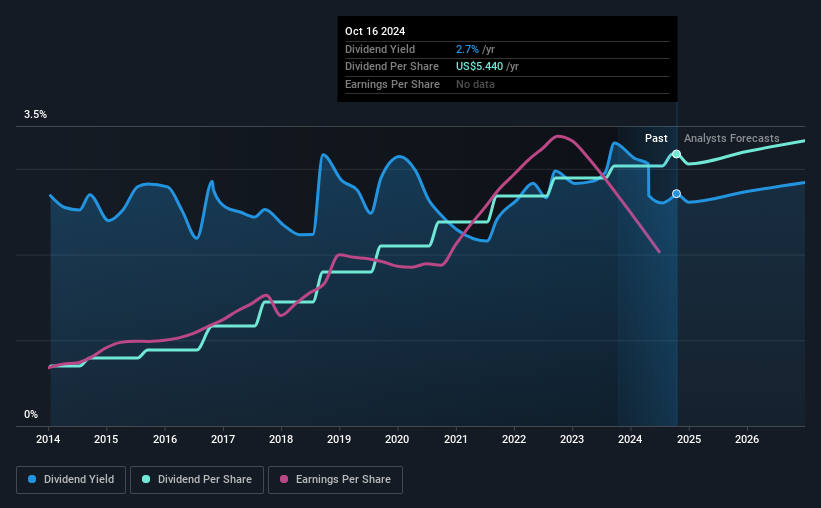Texas Instruments (NASDAQ:TXN) Will Pay A Larger Dividend Than Last Year At $1.36
Texas Instruments Incorporated (NASDAQ:TXN) will increase its dividend from last year's comparable payment on the 12th of November to $1.36. This takes the dividend yield to 2.7%, which shareholders will be pleased with.
Check out our latest analysis for Texas Instruments
Texas Instruments' Projected Earnings Seem Likely To Cover Future Distributions
While it is great to have a strong dividend yield, we should also consider whether the payment is sustainable. Before making this announcement, Texas Instruments was paying out quite a large proportion of both earnings and cash flow, with the dividend being 332% of cash flows. This is certainly a risk factor, as reduced cash flows could force the company to pay a lower dividend.
Looking forward, earnings per share is forecast to rise by 53.0% over the next year. Assuming the dividend continues along the course it has been charting recently, our estimates show the payout ratio being 68% which brings it into quite a comfortable range.

Texas Instruments Has A Solid Track Record
Even over a long history of paying dividends, the company's distributions have been remarkably stable. Since 2014, the annual payment back then was $1.20, compared to the most recent full-year payment of $5.44. This works out to be a compound annual growth rate (CAGR) of approximately 16% a year over that time. It is good to see that there has been strong dividend growth, and that there haven't been any cuts for a long time.
Texas Instruments May Find It Hard To Grow The Dividend
Some investors will be chomping at the bit to buy some of the company's stock based on its dividend history. Unfortunately, Texas Instruments' earnings per share has been essentially flat over the past five years, which means the dividend may not be increased each year. There are exceptions, but limited earnings growth and a high payout ratio can signal that a company has reached maturity. That's fine as far as it goes, but we're less enthusiastic as this often signals that the dividend is likely to grow slower in the future.
The Dividend Could Prove To Be Unreliable
Overall, we always like to see the dividend being raised, but we don't think Texas Instruments will make a great income stock. Although they have been consistent in the past, we think the payments are a little high to be sustained. We would be a touch cautious of relying on this stock primarily for the dividend income.
Market movements attest to how highly valued a consistent dividend policy is compared to one which is more unpredictable. Meanwhile, despite the importance of dividend payments, they are not the only factors our readers should know when assessing a company. As an example, we've identified 2 warning signs for Texas Instruments that you should be aware of before investing. If you are a dividend investor, you might also want to look at our curated list of high yield dividend stocks.
Have feedback on this article? Concerned about the content? Get in touch with us directly. Alternatively, email editorial-team (at) simplywallst.com.
This article by Simply Wall St is general in nature. We provide commentary based on historical data and analyst forecasts only using an unbiased methodology and our articles are not intended to be financial advice. It does not constitute a recommendation to buy or sell any stock, and does not take account of your objectives, or your financial situation. We aim to bring you long-term focused analysis driven by fundamental data. Note that our analysis may not factor in the latest price-sensitive company announcements or qualitative material. Simply Wall St has no position in any stocks mentioned.
 Index Options
Index Options CME Group
CME Group Nasdaq
Nasdaq Cboe
Cboe TradingView
TradingView Wall Street Journal
Wall Street Journal